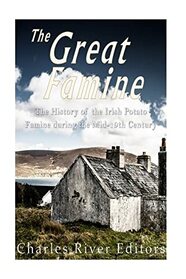The Great Potato Famine began in the 1840s, and ten years later, the population was down by 4 million. About one million starved, and many people left the country (about 3 million), yet the British exported enough food from Ireland to prevent starvation. By the end of the potato blight, America, Great Britain, and Ireland were permanently altered.
The stats are appalling --
* Most of the emigrants away from Ireland went by ship, and conditions on the ships were awful (they were called 'coffin ships.')
* Many ships were not seaworthy or carried disease. There needed to be more food for the passengers.
*Thousands died in shipwrecks.
* The young and healthy were most likely to emigrate.
The author was redundant; all of the salient information was enclosed in chapter six. The most significant change was in the way the land was used. Before the Famine, the land continued to be parceled to the male children, making it harder to eke a livelihood from the ground. During the Famine, landowners changed from farming to animal husbandry, leaving thousands without a place to live or work.
Before the Famine, Catholic farmers were happy with religious freedom. But the Famine created bitterness in the survivors, which made a generation look for independence from Great Britain. That bitterness led to the creation of the Irish independence organizations (IRA, for instance).
This book's explanation sounded like genocide to me; no wonder the Irish hate the British so much. The author tried to dismiss genocide -- obviously, the author cannot read what he wrote.
The stats are appalling --
* Most of the emigrants away from Ireland went by ship, and conditions on the ships were awful (they were called 'coffin ships.')
* Many ships were not seaworthy or carried disease. There needed to be more food for the passengers.
*Thousands died in shipwrecks.
* The young and healthy were most likely to emigrate.
The author was redundant; all of the salient information was enclosed in chapter six. The most significant change was in the way the land was used. Before the Famine, the land continued to be parceled to the male children, making it harder to eke a livelihood from the ground. During the Famine, landowners changed from farming to animal husbandry, leaving thousands without a place to live or work.
Before the Famine, Catholic farmers were happy with religious freedom. But the Famine created bitterness in the survivors, which made a generation look for independence from Great Britain. That bitterness led to the creation of the Irish independence organizations (IRA, for instance).
This book's explanation sounded like genocide to me; no wonder the Irish hate the British so much. The author tried to dismiss genocide -- obviously, the author cannot read what he wrote.




